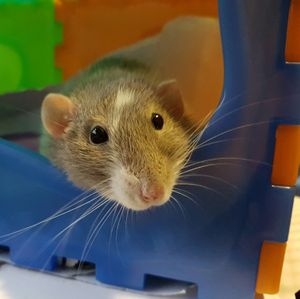
Respiratory illness is one of the most common medical conditions seen in pet rats. Both acute respiratory illness and chronic have been well documented. Acute bacterial pneumonia is characterized by sudden onset of symptoms and is often caused by Corynebacterium kutscheri or Streptococcus pneumonia. Corynebacterium kutscheri is often referred to as pseudotuberculosis (a.k.a. false tuberculosis) and is more often seen in older rats. On the other hand, Streptococcus pneumonia is more commonly diagnosed in younger rats and is actually contagious to people. Chronic disease, commonly referred to as murine respiratory mycoplasmosis, is caused by Mycoplasma pulmonis. Co-infections with cilia-associated respiratory bacillus, Sendai virus, or Sialodacryoadenitis virus are common.
Symptoms of respiratory illness in rats include difficulty breathing, rapid respirations, blue gums, sneezing, ocular/nasal discharge, red pigment staining around the nose, eyes, and front paws, lethargy, head tilt to rolling, muffled heart sounds on veterinary examination, and acute death in severe cases.
Medical conditions with similar symptoms to respiratory infections in rats include congestive heart failure, chronic respiratory disease, sepsis, otitis media, and different types of cancers.
Following a thorough physical examination, your veterinarian may recommend chest X-rays. X-rays of the skull may also be recommended to evaluate the inner ear. Blood testing may also be recommended to evaluate the body’s response to infection through a whole blood cell count and metabolic state through a serum biochemistry panel. Your veterinarian may also recommend microbial culture and a DNA probe (a.k.a. PCR) test for Mycoplasma especially if the patient isn’t responding as expected to treatment.
Initial therapy involves stabilizing the patient. Hospitalization for oxygen therapy is necessary for patients struggling to breathe. Patients should remain hospitalized until stable on oral medications. Your vet will prescribe appropriate antibiotics and anti-inflammatory medications based on the patient’s illness and needs. Additional treatment with bronchodilators, fluid therapy, and assist feeding. Patients with chronic illness may require long-term or pulse therapy as well as may be prescribed medications to treat secondary chronic pulmonary hypertension.
Acute respiratory disease can progress to chronic respiratory disease. Once chronic disease is established, it cannot be eliminated but it can be managed, however, flare-ups are likely to recur. Chronic disease is progressive, eventually negatively impacting a patient’s quality of life.
Patients should be hospitalized until stable, off of supplemental oxygen, and can take oral medications. A recheck examination is then recommended in 7 days, sooner if worse or if there is any respiratory distress, and again at the end of antibiotic treatment to make sure the symptoms have resolved.
Copyright © All Rights Reserved
